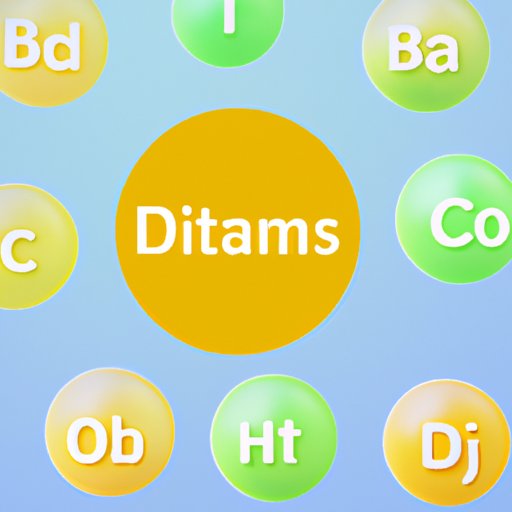
Introduction
Anxiety affects millions of people worldwide, and its prevalence is increasing day-by-day. Anxiety disorders can have debilitating effects on an individual’s everyday life, affecting their work, relationships, and overall well-being. Fortunately, there are many ways to manage anxiety and related symptoms. One effective method is the use of vitamins, which are known to provide numerous health benefits, including anxiety relief. In this article, we’ll explore the various vitamins that help with anxiety.
The Anxiety-Reducing Benefits of Vitamin B Complex: A Comprehensive Guide
Vitamin B Complex consists of eight B vitamins that are essential to maintaining good health. These vitamins include Thiamine (B1), Riboflavin (B2), Niacin (B3), Pantothenic Acid (B5), Pyridoxine (B6), Biotin (B7), Folic Acid (B9), and Cobalamin (B12). These vitamins are involved in various body functions, including energy production, cell metabolism, and mental health regulation. Vitamin B Complex helps reduce anxiety and its related symptoms by supporting the nervous system, improving mood, and reducing stress.
Some of the foods that are rich in B vitamins include legumes, whole grains, nuts, seeds, dairy products, eggs, and leafy greens. If you are not getting enough vitamin B complex from your diet, you might want to consider taking vitamin B complex supplements under medical supervision.
Vitamin D and Anxiety Connection: How to Boost Your Mood and Ease Anxiety Symptoms
Vitamin D, often known as the “sunshine vitamin,” plays an important role in maintaining bone health and providing immunity. Recent studies suggest that low levels of vitamin D in the body can also result in anxiety and depression. Vitamin D helps modulate the mood-regulating hormone serotonin levels, and its deficiency can lead to mood swings, anxiety, and depression.
The best way to get vitamin D is through sunlight exposure, but many people do not get enough sunlight due to working indoors. Foods that contain vitamin D include fatty fish, egg yolks, and mushrooms. Vitamin D supplementation is another option that can help to regulate vitamin D levels in the body.
5 Powerful Reasons Why Vitamin C is Essential for Anxiety Relief
Vitamin C is an essential nutrient that is involved in numerous body functions, including immunity, wound healing, and skin health. In addition, Vitamin C can help reduce stress and anxiety levels. Vitamin C is an antioxidant, and it helps reduce inflammation in the body, which is often associated with anxiety. Moreover, Vitamin C helps regulate cortisol levels, a hormone associated with stress.
Foods that are rich in vitamin C include citrus fruits, kiwi, strawberries, bell peppers, and broccoli. Taking Vitamin C supplements is also an effective way to improve your vitamin C intake.
The Science Behind Vitamin E and its Role in Managing Anxiety
Vitamin E, another antioxidant vitamin, can help reduce anxiety by reducing oxidative stress and inflammation in the body. Vitamin E can also help improve cognitive function and promote healthy brain function. Studies have shown that adding Vitamin E to your diet can reduce anxiety and help elevate mood.
Vitamin E is abundant in foods such as nuts, seeds, and leafy vegetables. You may also consider taking Vitamin E supplements with your doctor’s approval if you are not getting enough Vitamin E from your diet.
Natural Anxiety Remedies: How Vitamin B6 Can Help Alleviate Symptoms
Vitamin B6, another B vitamin, is essential in maintaining a healthy nervous system. It helps to reduce anxiety and improve mood by regulating the production of neurotransmitters in the brain. Vitamin B6 also helps regulate sleep, which is often disturbed in anxious individuals.
Some of the food sources of Vitamin B6 include bananas, chickpeas, tuna, turkey, and potatoes. However, it’s important to note that overconsumption of Vitamin B6 can lead to toxicity. Therefore, it’s always best to seek medical advice before taking Vitamin B6 supplements.
Could Vitamin Supplements Be the Solution to Your Anxiety? A Closer Look at the Research
While vitamins can be an effective way to reduce anxiety symptoms, it’s important to understand that supplements are not a cure for anxiety disorders. Supplementation can’t replace medical treatment, and it’s essential to seek professional advice to determine the most effective plan to manage your anxiety. Many studies have investigated the benefit of using vitamins as alternative treatments for managing anxiety. Still, more research is required. Vitamin supplements could potentially interfere with other medications, leading to undesired consequences. Therefore, it’s always best to seek a doctor’s approval before taking any supplements.
Conclusion
In this article, we have explored the vitamins that can help alleviate anxiety symptoms, including Vitamin B Complex, Vitamin D, Vitamin C, Vitamin E, and Vitamin B6. While these vitamins can be an effective way to manage anxiety, it’s important to note that a balanced diet and a healthy lifestyle are essential in promoting good mental health. Therefore, it’s always best to seek medical advice before taking supplements or making significant changes to your diet.





